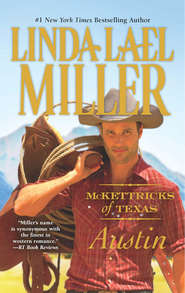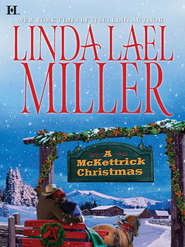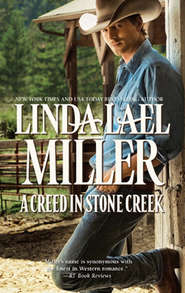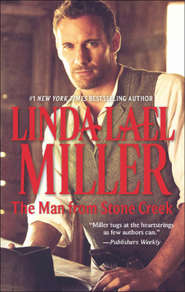По всем вопросам обращайтесь на: info@litportal.ru
(©) 2003-2024.
✖
A Creed Country Christmas
Автор
Год написания книги
2019
Настройки чтения
Размер шрифта
Высота строк
Поля
“Oh, for heaven’s sake,” Gracie protested, disgruntled.
But she got out of her chair at the table, said good-night to Tom and stood on tiptoe to kiss Lincoln on the cheek.
His heart melted like a honeycomb under a hot sun when she did that. Her blue eyes, so like Beth’s, sparkled as she looked up at him, then turned solemn.
“Be nice to Miss Mitchell, Papa,” she instructed solemnly. “Stand up when she comes into a room, and pull her chair back for her. We want her to like it here and stay.”
Lincoln’s throat constricted, and his eyes burned. He couldn’t have answered to save his hide from a hot brand.
“You’ll come and hear my prayers?” Gracie asked, the way she did every night.
The prayers varied slightly, but certain parts were always the same.
Please keep my papa safe, and Tom, too. I’d like a dog of my very own, one that will fetch, and I want to go to school, so I don’t grow up to be stupid….
Lincoln nodded his assent. Though it was a request he never refused, Gracie always asked.
Once she left the room, Tom set his cup in the sink, folded his arms. “According to young Joseph,” he said, “he and his sister have folks in North Dakota—an aunt and a grandfather. Soon as he can save enough money, he means to head for home and take Theresa with him.”
Lincoln felt a lot older than his thirty-five years as he raised himself from his chair, began turning down lamp wicks, one by one. Tom, in the meantime, banked the fire in the cookstove.
They were usual, these long gaps in their conversations. Right or wrong, Lincoln had always been closer to Tom than to his own father—Josiah Creed had been a hard man in many ways. Neither Lincoln nor Wes had mourned him overmuch—they left that to Micah, the eldest, and their mother.
“Did the boy happen to say how he and the girl wound up in a school outside of Stillwater Springs, Montana?”
Tom straightened, his profile grim in the last of the lantern light. “The government decided he and his sister would be better off if they learned white ways,” he said. “Took them off the reservation in North Dakota a couple of years ago, and they were in several different ‘institutions’ before their luck changed. They haven’t seen their people since the day they left Dakota, though Juliana helped him write a letter to them six months back, and they got an answer.” Tom paused, swallowed visibly. His voice sounded hoarse. “The folks at home want them back, Lincoln.”
Lincoln stood in the relative darkness for a few moments, reflecting. “I’ll send them, then,” he said after a long time. “Put them on the train when it comes through next week.”
Tom didn’t answer immediately, and when he did, the whole Trail of Tears echoed in his voice. “They’re just kids. They oughtn’t to make a trip like that alone.”
Another lengthy silence rested comfortably between the two men. Then Lincoln said, “You want to go with them.”
“Somebody ought to,” Tom replied. “Make sure they get there all right. Might be that things have changed since that letter came.”
Lincoln absorbed that, finally nodded. “What about the little ones?” he asked without looking at his friend. “Daisy and Billy-Moses?”
“They’re orphans,” Tom said, and sadness settled over the darkened room like a weight. “Reckon Miss Mitchell planned on keeping them until she could find them a home.”
Lincoln sighed inwardly. Until she could find them a home. As if those near-babies were stray puppies or kittens.
With another nod, this one sorrowful, he turned away.
It was time to turn in; morning would come early.
But damned if he’d sleep a wink between the plight of four innocent children and the knowledge that Juliana Mitchell was lying on the other side of the wall.
Chapter Two
The mattress felt like a cloud, tufted and stuffed with feathers from angels’ wings, beneath Juliana’s weary frame, but sleep eluded her. Daisy slumbered innocently at her right side, sucking one tiny thumb, while Billy-Moses snuggled close on the left, clinging to her flannel nightgown—the cloth was still chilled from being rolled up in her satchel, out in the weather most of the day.
Juliana listened as the sturdy house settled around her, her body still stiff with tension, that being its long-established habit, heard a plank creaking here, a roof timber there. She caught the sound of a door opening and closing just down the corridor, pictured Lincoln Creed passing into his room, or bending over little Gracie’s bed to tuck her in and bid her good-night. Would he spare a kind word for Theresa, who was sharing Gracie’s room, and so hungry for affection, or reserve all his attention for his little daughter?
Gracie was a charming child, as lovely as a doll come to life, with those thickly lashed eyes, golden ringlets brushing her shoulders and the pink-tinged porcelain perfection of her skin. Privileged by comparison to most children, not to mention the four in Juliana’s own charge, Gracie was precocious, but if she was spoiled, there had been no sign of it yet. She’d greeted the new arrivals at Stillwater Springs Ranch with frank curiosity, yes, but then she’d ladled milk into mugs for them, even served it at the table.
Juliana’s heart pinched. Gracie had a strong, loving father, a home, robust good health. But behind those more obvious blessings lurked a certain lonely resignation uncommon in one so young. Gracie had lost her mother at a very early age, and no one understood the sorrows of that more than Juliana herself—she’d been six years old when her own had succumbed to consumption. Juliana’s father, outraged by grief, torn asunder by it, had dumped both his offspring on their maternal grandmother’s doorstep barely two weeks after his wife’s funeral and, over the next few years, delivered himself up to dissolution and debauchery.
Clay, nine at the time of their mother’s passing, had changed from a lighthearted, mischievous boy to a solemn-faced man, seemingly overnight. In a very real way, Juliana had lost him, in addition to both her parents.
Victoria Marston, their grandmother, already a widow when her only daughter had died, dressed in mourning until her own death a decade later, but she had loved Juliana and Clay tirelessly nonetheless. Grandmama had given them every advantage—tutors, music lessons, finishing school for Juliana, who had immediately changed the course of her study to train as a schoolteacher upon the discovery that “finishing” involved learning to make small talk with men, the proper way to pour tea and a lot of walking about with a book balanced on top of her head. There had been college in San Francisco for Clay, even a Grand Tour.
Juliana had stayed behind in Denver, living at home with Grandmama, attending classes every day and letting her doting grandmother believe she was being thoroughly “finished,” impatiently waiting for her life to begin.
For all the things she would have changed, she appreciated her blessings, too; she’d been well-cared-for, beautifully clothed and educated beyond the level most young women attained. Yet, there was still a childlike yearning inside Juliana, a longing for her beautiful, laughing mama. The singular and often poignant ache was mostly manageable—except when she was discouraged, and that had been often, of late.
After graduating from Normal School—her grandmother had died of a heart condition only weeks before Juliana accepted her certificate—she’d begun her career with high hopes, pushed up her sleeves and flung herself into the fray, undaunted at first by her brother’s cold disapproval. He’d wanted her to marry his business partner, John Holden, and because he controlled their grandmother’s large estate, Clay had had the power to disinherit her. On the day she’d given back John’s engagement ring and accepted her first teaching assignment at a school for Indian boys in a small Colorado town a day’s train ride from Denver, he’d done that, for all practical intents and purposes.
Juliana had been left with nothing but the few modest clothes and personal belongings she’d packed for the journey. Clay had gone so far as to ban her from the family home, saying she could return when she “came to her senses.”
To Clay, “coming to her senses” meant consigning herself to a loveless marriage to a widower more than twenty years her senior, a man with two daughters close to Juliana’s own age.
Mean daughters, who went out of their way to be snide, and saw their future stepmother as an interloper bent on claiming their late mother’s jewelry, as well as her home and husband.
Remembering, Juliana bit down on her lower lip, and her eyes smarted a little. She might have been content with John, if not happy, had it not been for Eleanor and Eugenie. He was gentle, well-read, and she’d felt safe with him.
In a flash of insight and dismay, Juliana had realized she was looking for a father, not a husband. She’d explained to John, and though he’d been disappointed, he’d understood. He’d even been gracious enough to wish her well.
Clay, by contrast, had been furious; his otherwise handsome features had turned to stone the day she’d told him about the broken engagement.
In the six years since, he’d softened a little—probably because his wife, Nora, had lobbied steadily on Juliana’s behalf—writing regularly, even inviting Juliana home for visits and offering to ship the clothing and books she’d left behind, but when it came to her inheritance, he’d never relented.
Even when John Holden had died suddenly, a year before, permanently disqualifying himself as a possible husband for the sister Clay had once adored and protected, teased and laughed with, he had not given ground. After months of working up her courage, she’d written to ask for a modest bank draft, since her salary was small, less than the allowance her grandmother had given her as a girl, and Clay had responded with words that still blistered Juliana’s pride, even now. “I won’t see you squandering good money,” he’d written, “on shoes and schoolbooks for a pack of red-skinned orphans and strays.”
A burning ache rose in Juliana’s throat at the memory.
Clay would cease punishing her when she stopped teaching and married a man who met with his lofty approval, then and only then, and that was the unfortunate reality.
She’d been a fool to write to him that last time, all but begging for the funds she’d needed to get Joseph and Theresa safely home to North Dakota and look after the two little ones until proper homes could be found for them.
The situation was further complicated by the fact that Mr. Philbert, an agent of the Bureau of Indian Affairs and therefore Juliana’s supervisor, believed the four pupils still in her charge had been sent back to their original school in Missoula, along with the older students. Sooner or later, making his rounds or by correspondence, Philbert, a diligent sort with no softness in him that Juliana could discern, would realize she’d not only disobeyed his orders, but lied to him, at least in part.
As an official representative of the United States government, the man could have her arrested and prosecuted for kidnapping, and consign Daisy and Billy-Moses to some new institution, far out of her reach, where they would probably be neglected, at best. Juliana knew, after working in a series of such places, all but bloodying her very soul in the effort to change things, that only the most dedicated reformers would bother to look beyond the color of their skin. And there were precious few of those.
To keep from thinking about Mr. Philbert and his inevitable wrath, Juliana turned her mind to the students she’d had to bid farewell to—Mary Rose, seventeen and soon to be entering Normal School herself; Ezekiel, sixteen, who wanted to finish his education and return to his tribe. Finally, there was Angelique, seventeen, like her cousin Mary Rose, sweet and unassuming and smitten with a boy she’d met while running an errand in Stillwater Springs one spring day.
Part Blackfoot and part white, Blue Johnston had visited several times, a handsome, engaging young man with a flashing white smile and the promise of a job herding cattle on a ranch outside of Missoula. Although Juliana had kept close watch on the couple and warned Angelique repeatedly about the perils of impulse, she’d had the other children to attend to, and the pair had strayed out of her sight more than a few times.
Privately, Juliana feared that Angelique and her beau would run away and get married as soon as they got the chance—and that chance had come a week before, when Angelique and the others had boarded the train to return to Missoula. Should that happen—perhaps it already had—Mr. Philbert would bluster and threaten dire consequences when he learned of it, all the while figuratively dusting his hands together, secretly relieved to have one less obligation.











